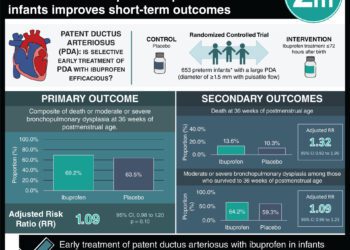Paracetamol plus ibuprofen significantly reduces post-operative morphine use in total hip arthroplasty patients
1. In this randomized controlled trial, ibuprofen plus paracetamol significantly reduced morphine consumption in post-operative patients who underwent a total hip arthroplasty compared with paracetamol alone
2. There was no significant difference in serious adverse events in groups receiving ibuprofen and those receiving paracetamol.
Evidence Rating Level: 1 (Excellent)
Study Rundown: Multimodal postoperative analgesia is widely used as a way to reduce the amount of opiates consumed, and thus, many multimodal postoperative analgesia protocols include nonopioid medications such as paracetamol, also known as acetaminophen, and nonsteroidal anti-inflammatory drugs (NSAIDs). However, the optimal analgesia strategy is still unclear. In this randomized controlled trial, the combination of paracetamol and ibuprofen significantly reduced morphine consumption for 24 hours post-operatively in total hip arthroplasty (THA) patients compared to those who only received paracetamol. There was no significant difference in the morphine-sparing effect between the combination of paracetamol and ibuprofen compared to ibuprofen alone. There were no differences in severe adverse effects between groups. Patient-reported pain scores at 24 hours were also significantly lower with paracetamol plus ibuprofen compared with either ibuprofen alone or paracetamol alone.
Though this study suggests combination ibuprofen and paracetamol may be superior to either drug along, patients who pre-operatively were being treated with gabapentinoids, glucocorticoids, selective serotonin reuptake inhibitors, tramadol, or codeine were not excluded from this study, and these medications were continued in the peri-operative period, representing a possible source of confounding. In addition, over 30% of patients were taking daily NSAIDs prior to surgery.
Click to read the study, published today in JAMA
Relevant Reading: Postoperative multimodal analgesia pain management with nonopioid analgesics and techniques: a review
In-Depth [randomized controlled trial]: In the Paracetamol and NSAID (PANSAID) trial, a total of 556 patients were included in the primary analysis to determine the morphine-sparing effect of the addition of non-opiates in post-operative pain control. Patients were recruited from December 2015 to October 2017 in six Danish hospitals and were randomized to receive a combination of paracetamol (1000 mg) and ibuprofen (400mg; n= 136), paracetamol alone (n= 142), ibuprofen alone (n= 139), or a half dose paracetamol (500 mg) and ibuprofen (200 mg; n= 139). Overall the median 24-hour morphine consumption was 20 mg in the full dose combination group, 36 mg in the paracetamol alone group, 26 mg in the ibuprofen alone group, and finally 28 mg in the half dose combination group. Patients in the full dose combination group consumed significantly less morphine in the post-operative period when compared to paracetamol alone (CI99.6 6.5 to 24mg). There was no significant difference in morphine consumption between the ibuprofen-alone group and the half dose combination group (difference 2 mg; CI99.6 -10 to 7). At 24 hours, patients in the full dose combination group reported significantly lower pain scores at rest than all other groups (p < 0.05). Overall 14% of patients reported 1 or more severe adverse event. The relative risk of a serious adverse event was 1.44 (CI97.5 0.79 to 2.64).
Image: PD
©2019 2 Minute Medicine, Inc. All rights reserved. No works may be reproduced without expressed written consent from 2 Minute Medicine, Inc. Inquire about licensing here. No article should be construed as medical advice and is not intended as such by the authors or by 2 Minute Medicine, Inc.







